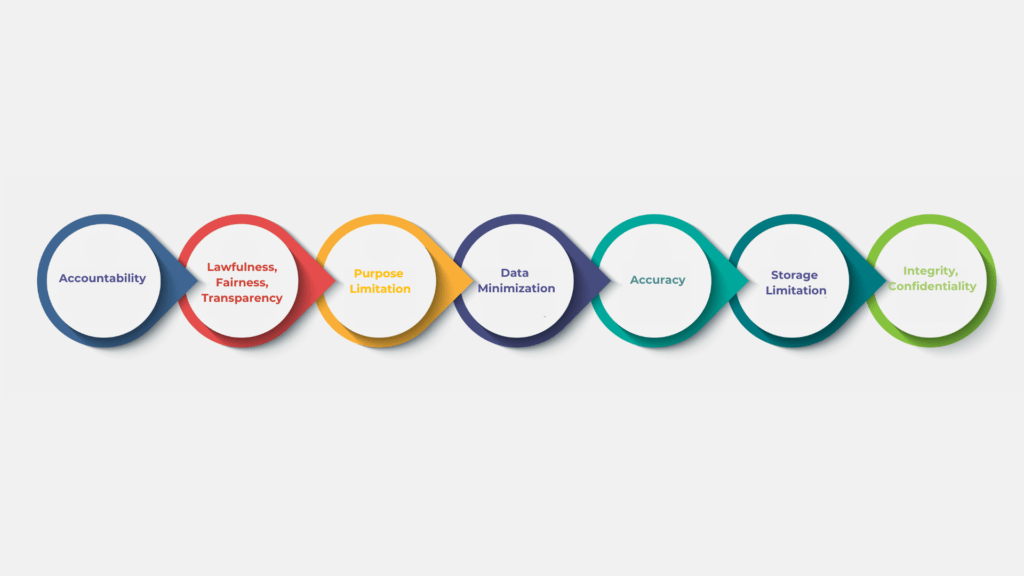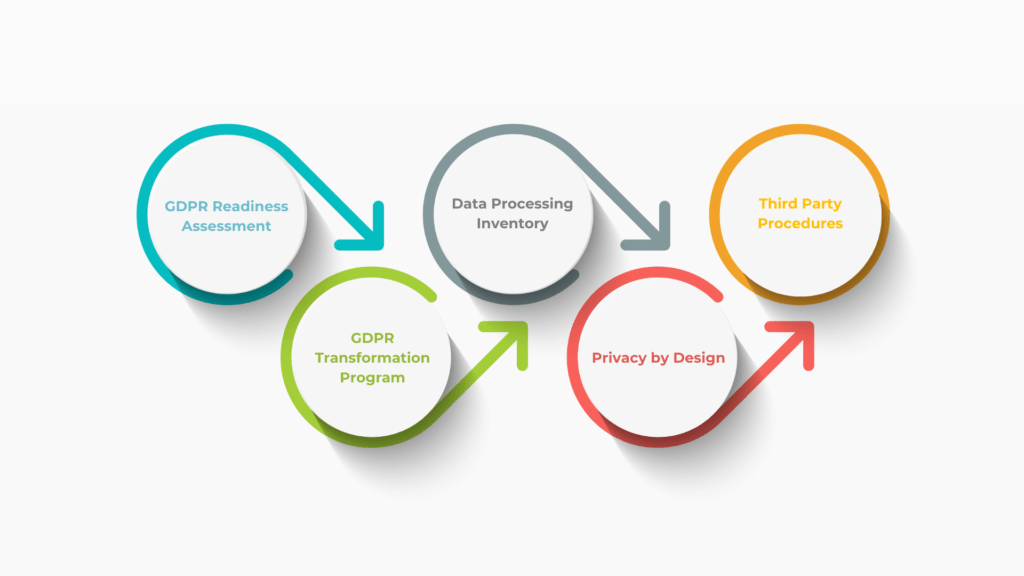GDPR
What is GDPR?
Ensuring GDPR compliance
The GDPR, effective as of May 25, 2018, is a regulatory standard for the handling of personal data by entities dealing with EU citizens, emphasizing their privacy rights and data security. It mandates strict guidelines for data collection and processing, applying to any organization worldwide that processes the data of EU individuals.
GPDR Principles

The GDPR impacts many areas of an organisation: legal and compliance, technology, and data.
The GDPR brings about significant changes for legal and compliance roles, necessitating the appointment of Data Protection Officers (DPOs) in many organizations to ensure adherence. This regulation underscores the importance of organizational accountability and mandates a review and simplification of privacy policies for better clarity and governance.
The GDPR mandates significant shifts in technology design and management, requiring documented privacy assessments for new systems and technologies. Organizations must report security breaches within 72 hours, necessitating updated incident response procedures. “Privacy By Design” is now a legal requirement, with Privacy Impact Assessments becoming standard practice. Additionally, there’s an expectation for organizations to increasingly adopt data masking, pseudonymization, and encryption to enhance data privacy and security.
Individuals and teams responsible for managing information will face the task of enhancing transparency in data storage, tracking, and origin. Understanding the specifics of data collection and storage locations will simplify adherence to updated data subject rights, including the right to data deletion and transfer to different organizations.
What do the fines look like?
The size and scope of potential GDPR fines have made compliance a priority for companies around the world.
Even organizations based outside the EU must comply if they process data on EU residents. While fines are a focal point of GDPR discussions, regulatory authorities possess broader corrective measures, such as data processing restrictions and mandatory audits, to enforce compliance.
The GDPR categorizes fines into two levels for breaches: up to €10 million or 2% of global turnover for less severe violations, and up to €20 million or 4% for more severe cases. The criteria for these fines are based on specific articles, with the higher tier targeting violations that affect core data protection principles, individual rights, and sensitive data. The calculation of fines considers the total global turnover of a corporate group, not just the violating subsidiary. Factors influencing fine amounts include the infringement’s nature, intent, mitigation efforts, and previous violations, allowing for tailored penalties.
What Stroople can do for you?
Pragmatic and tailored approach to GDPR compliance
For those seeking assistance with GDPR compliance and ongoing adherence to data protection laws, Stroople’s GDPR consultants are available to offer a variety of services tailored to your needs.
Our privacy strategy leverages industry best practices, Stroople’s advisory approach, and our insights from privacy and cybersecurity projects with leading companies.
Steps for GDPR Readiness

DPO As A Service
DPO As A Service offers a comprehensive solution for GDPR compliance, providing access to a team of specialized data protection experts. It ensures conflict-free advice, keeps businesses updated on legal changes, and offers flexible support options, including on-site or remote assistance, ad hoc advice, urgent response services, and annual GDPR audits for stakeholder assurance.
Conducting a Gap Analysis
Gap analysis is a key service offering a comprehensive review over 2 or 3 days to evaluate your GDPR compliance level, uncover gaps and weaknesses, and help you draft and execute a prioritized action plan. This assessment, which can be performed remotely or in-person, involves discussions with selected staff and a review of key documents to understand your data processing practices, security measures, and third-party data protection agreements. You’ll receive a comprehensive report to visualize compliance levels and focused advice on prioritizing areas for improvement.
Remediation Support
Following a gap analysis on GDPR compliance, we offer bespoke support to bridge these gaps. Whether it’s developing a comprehensive data protection policy, advising on data retention, managing third-party suppliers, or enhancing data breach procedures, our assistance extends across all necessary remediation efforts. We also aid in refining data retention schedules, updating privacy notices, and maintaining accurate processing records, ensuring you meet all compliance requirements effectively.
Data Protection Impact Assessments (DPIAs)
A Data Protection Impact Assessment (DPIA) is a vital tool for identifying and mitigating personal data processing risks, gaining importance under the GDPR for high-risk processing activities. DPIAs help lower data breach risks and ensure rights protection, offering compliance, financial, and reputational advantages by fostering accountability and trust. Our consultants guide on when and how to conduct DPIAs effectively, including risk identification and mitigation strategies, and offer a review service to confirm appropriate actions are taken, making DPIAs a standard practice for organizational data protection.
Delivering Records of Processing Activities (ROPAs)
The GDPR emphasizes a risk-based approach, notably through the DPIA requirement. Yet, many organizations overlook the Record of Processing Activities (ROPA), a crucial tool for identifying data processing risks, mandated under Article 30. A ROPA, in our view, should be central to any data protection strategy. We assist leading organizations in developing their ROPAs, identifying potential processing risks and devising mitigation strategies. Remember, in the event of a data breach, a ROPA is often among the first documents regulators will request.

